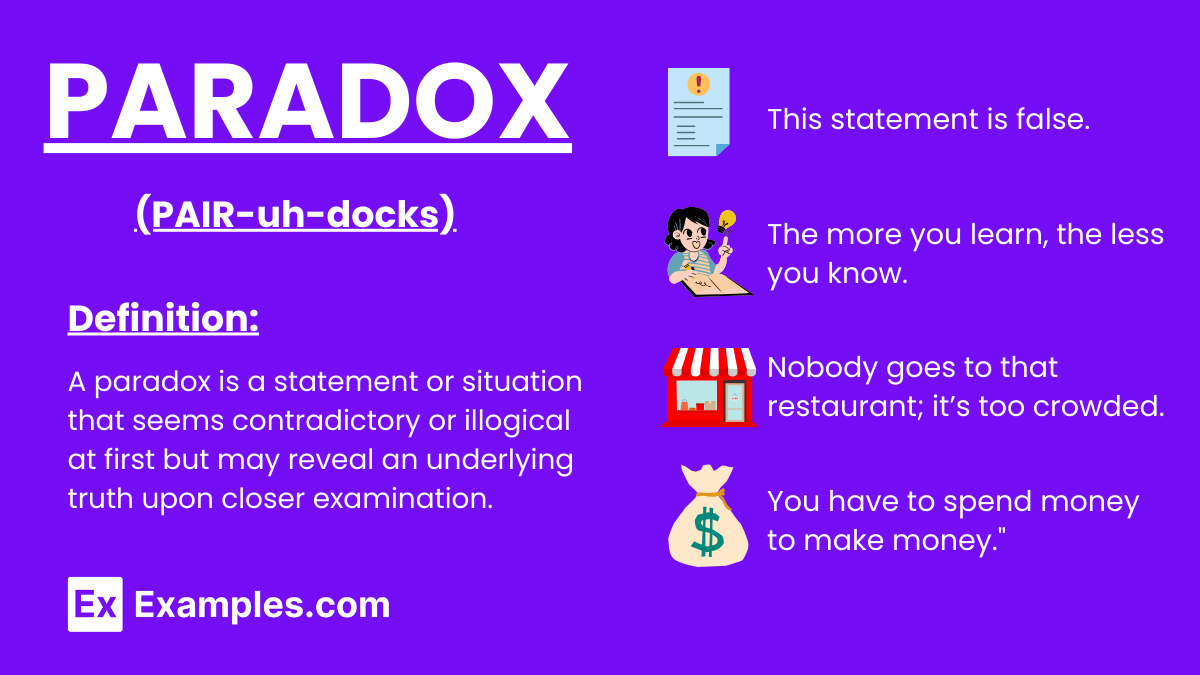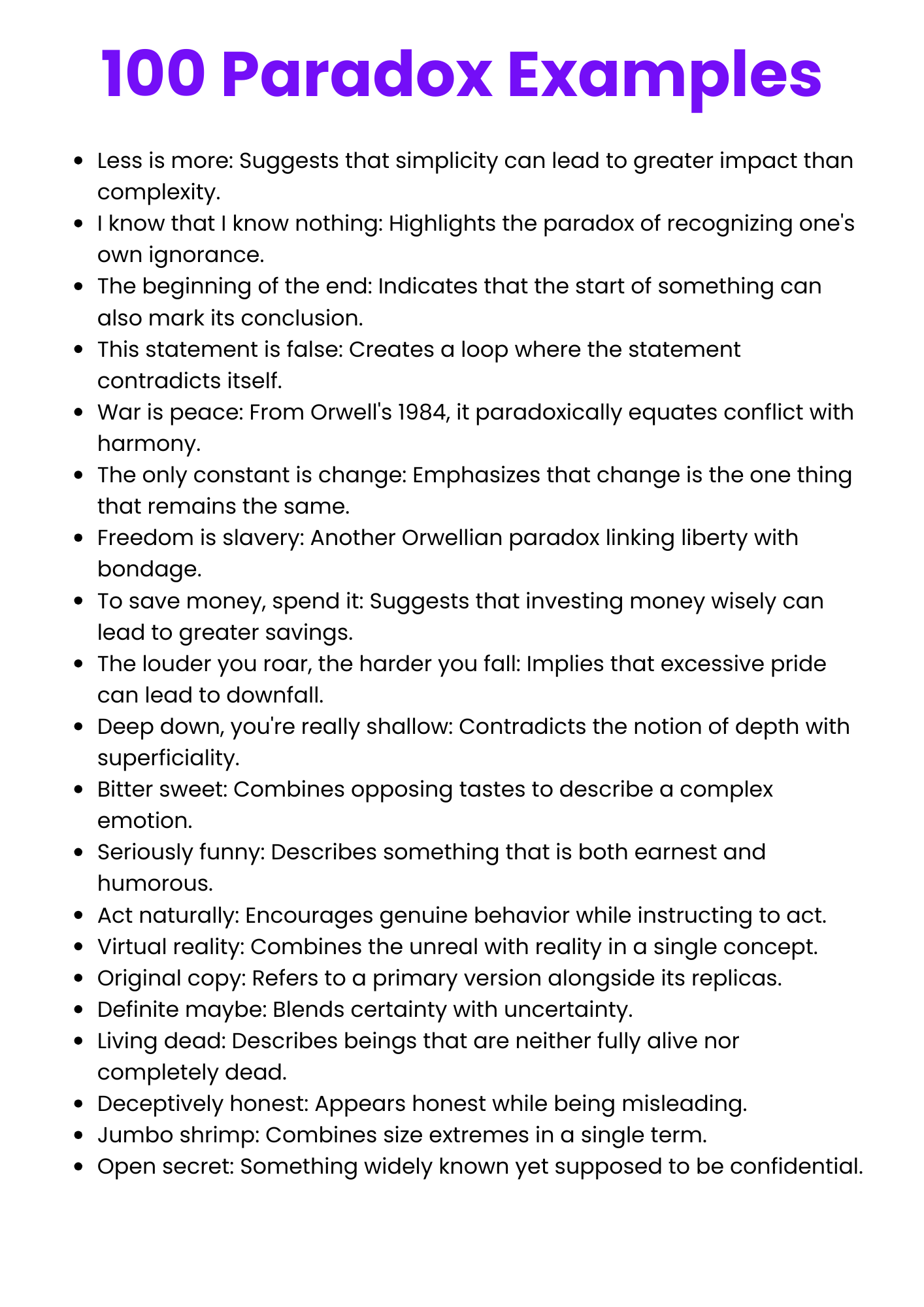Paradox
What is a Paradox? – Definition
A paradox is a statement or situation that appears self-contradictory or illogical but often reveals a deeper or unexpected truth. Logical paradoxes defy reasoning, initially seeming plausible but proving impossible upon scrutiny. Literary paradoxes, on the other hand, challenge conventional logic to expose profound insights or hidden meanings, enriching the understanding of complex ideas.

Generated Paradox Examples

Examples of Paradoxes
- Less is more.
- This statement is false.
- I know that I know nothing.
- The only constant is change.
- I can resist anything except temptation.
- The beginning of the end.
- The more you know, the more you realize you don’t know.
- I must be cruel to be kind.
- To save money, spend it.
- This is the beginning of the end.
- The only rule is there are no rules.
- War is peace.
- The pen is mightier than the sword.
- Only the uneducated are easily pleased.
- To be natural is such a very difficult pose to keep up.
- You have to be cruel to be kind.
- I must be a liar to tell the truth.
- This is the start of something new and the end of something old.
- The more things change, the more they stay the same.
- I always lie.
- The more you try to control something, the more out of control it becomes.
- I can fly without wings.
- Beauty is only skin deep.
- Decrease is an increase.
- The only thing we know is that we know nothing.
- It’s a wise fool.
- To bring peace, prepare for war.
- You cannot serve both God and money.
- This is the paradox of thrift.
Types of Paradoxes
Logical Paradoxes
Paradoxes that arise from reasoning and logic, often highlighting flaws or limitations in our understanding.
- This sentence is false.
- I always lie.
- Less is more.
- The beginning of the end.
- This statement is true.
Self-Referential Paradoxes
Paradoxes that refer back to themselves, often creating a loop that defies straightforward resolution.
- I know that I know nothing.
- This sentence contains exactly three as.
- Everything I say is a lie.
- This statement is false.
- The following statement is true. The previous statement is false.
Time Paradoxes
Paradoxes involving time, particularly those arising from concepts like time travel and causality loops.
- If you prevent your birth by traveling back in time, how can you exist?
- An object sent back in time exists without any origin point.
- Actions in the past predestine future events, creating a closed time loop.
- The lack of evidence for extraterrestrials despite high probability is baffling.
- Moving halfway to a destination repeatedly means you never arrive.
Fictional Paradoxes
Paradoxes used in stories and narratives to create complexity or deepen themes.
- A character accidentally creates their own enemy in the past.
- A story loops back to its own beginning endlessly.
- A person is simultaneously alive and dead in parallel timelines.
- A prophecy causes the very events it aimed to prevent.
- A book exists because it was copied from itself in the past.
Philosophical Paradoxes
Paradoxes that explore deep questions about reality, identity, and existence.
- If all parts of a ship are replaced, is it still the same ship?
- A set contains all sets that do not contain themselves.
- Can a barber who shaves all non-self-shavers shave himself?
- Does a set that contains itself truly exist?
- If we are simulated, is our reality genuine?
Practical Paradoxes
Paradoxes encountered in everyday life, often leading to counterintuitive outcomes.
- Saving during a recession can worsen the economy.
- Having too many options can make choosing harder.
- Water is essential but cheaper than non-essential diamonds.
- Your friends have more friends on average than you do.
- Delaying tasks creates stress and lowers quality.
Semantic Paradoxes
Paradoxes arising from ambiguities in language or meaning.
- A crocodile promises to return a child if the parent predicts correctly.
- A prisoner cannot guess their execution day despite being warned.
- Can a set of all sets contain itself?
- A barber shaves all who don’t shave themselves. Who shaves him?
- If this statement is false, is it true?
Literary Paradoxes
Paradoxes used in literature to create intriguing and thought-provoking narratives.
- A story where the protagonist is unknowingly the antagonist in another storyline.
- A book that writes itself as it is being read.
- Characters who are aware they are in a story and try to change the plot.
- A narrative that loops back to its beginning, creating an infinite cycle.
- A poem that contradicts its own theme.
How to Identify/Find Paradox?
To identify paradoxes, look for statements or situations that defy intuition or seem logically impossible. Paradoxes often involve self-reference, contradictory elements, or surprising outcomes that challenge conventional wisdom.
- Identify statements that contradict themselves or lead to logical inconsistencies.
- Look for scenarios where opposing ideas coexist in a way that challenges understanding.
- Analyze whether the paradox highlights a deeper truth or underlying issue.
- Notice if the paradox provokes critical thinking or reveals complexities in a subject.
- Examine how the paradox relates to broader themes or concepts.
How to Use Paradox?
Use paradoxes to provoke thought, highlight complexities, and engage your audience. Incorporate them in writing, speeches, or discussions to emphasize points, illustrate contradictions, or inspire deeper analysis.
- Choose paradoxes that are relevant and meaningful to your topic.
- Use clear and concise language to present the paradox effectively.
- Integrate paradoxes smoothly into your narrative or argument to enhance impact.
- Ensure the paradox adds depth or clarity to your message.
- Avoid overusing paradoxes to maintain their effectiveness and prevent confusion.
Other Paradox Examples
Paradoxes in Daily Life
Daily life is filled with paradoxes that help us understand and navigate complex situations.
- The more you learn, the less you know.
- You have to spend money to make money.
- The more you try to control something, the more it controls you.
- The paradox of thrift: Saving money during a recession can lead to a decrease in aggregate demand, worsening the economic situation.
- Friendship paradox: On average, your friends have more friends than you do.
Paradox Examples for Kids
Introduce children to the intriguing world of paradoxes with relatable and simple examples.
- This sentence is false.
- Less is more.
- You have to be cruel to be kind.
- I can resist anything except temptation.
- The beginning of the end.
Paradox Examples for Students
Empower students with paradoxes that make learning engaging and thought-provoking.
- The more you learn, the less you know.
- You must spend money to make money.
- The more you try to control something, the more it controls you.
- By pursuing happiness directly, you may never find it.
- To truly know yourself, you must become someone else.
Paradox Examples in Philosophy
Philosophical paradoxes that challenge our understanding of concepts like existence, knowledge, and reality.
- The Ship of Theseus: If all parts of a ship are replaced, is it still the same ship?
- The Barber Paradox: The barber shaves everyone who does not shave themselves. Does he shave himself?
- Russell’s Paradox: In set theory, does the set of all sets that do not contain themselves contain itself?
- The Grandfather Paradox: If you travel back in time and prevent your grandfather from meeting your grandmother, can you still exist?
- The Liar Paradox: “This statement is false.”
Paradox Examples in Literature
Paradoxes in literature enrich narratives and deepen thematic elements by presenting conflicting ideas.
- “I can resist anything except temptation.” – Oscar Wilde
- “The beginning of the end.” – Various Authors
- “War is peace.” – George Orwell, *1984*
- “Less is more.” – Ludwig Mies van der Rohe
- “I must be cruel to be kind.” – William Shakespeare, *Hamlet*
Hard Paradox Examples
Hard paradoxes use complex or abstract ideas to challenge perceptions and encourage critical thinking.
- “This statement is false.” – A classic self-referential paradox.
- “I always lie.” – Creates a logical inconsistency.
- “The following statement is true. The previous statement is false.”
- “To save money, spend it.” – Highlights the complexity of economic behavior.
- “I must be cruel to be kind.” – Demonstrates conflicting intentions.
Paradox Examples About Love
Thought-provoking paradoxes that capture the complexities and contradictions inherent in love.
- “The more I love you, the less I need you.”
- “To love someone is to allow them to be themselves, which can be both liberating and challenging.”
- “I love you more than I can say, yet saying it makes me feel vulnerable.”
- “Love is both a source of great joy and profound sorrow.”
- “The more you give, the more you receive.” – Reflects the reciprocal nature of love.
Explore Other Literary Devices
Elevate Your AP English Preparation
Unlock your potential with our comprehensive AP English exam preparation tools designed to help you excel.
- Extensive Question Bank: Access 900+ exam-like questions for both AP English Language and Literature.
- Expertly Crafted: Questions mirror the structure and difficulty of actual AP exams, ensuring relevant practice.
- Detailed Explanations: Understand your mistakes with clear, concise breakdowns of correct and incorrect answers.
- Personalized Learning: Tailor your study sessions with topic-specific tests and adaptive learning tools.
- Comprehensive Coverage: Master all aspects of the AP English curriculum with extensive guides and resources.
Frequently Asked Questions
-
What is paradox with example?
A paradox is a statement or situation that contradicts itself yet may reveal a hidden truth. For example, “This statement is false” is a paradox because if it’s true, then it must be false, and vice versa. -
What is a paradox in a person?
A paradox in a person refers to someone who exhibits contradictory traits or behaviors that coexist in a seemingly incompatible way. For example, a person may be both extremely confident and deeply insecure, creating a complex and intriguing character. -
What are two synonyms for paradox?
Two synonyms for paradox are “contradiction” and “enigma.” -
What is a paradox in truth?
A paradox in truth involves a situation where a statement or belief challenges conventional understanding, revealing deeper layers of meaning. It highlights that truth can be complex and multi-faceted, often containing inherent contradictions that encourage deeper reflection. -
What is a paradox of life?
A paradox of life is a situation where the pursuit of happiness or success can lead to unintended consequences. For example, the idea that seeking constant pleasure may result in dissatisfaction, or that achieving one’s goals might not bring the expected fulfillment.

